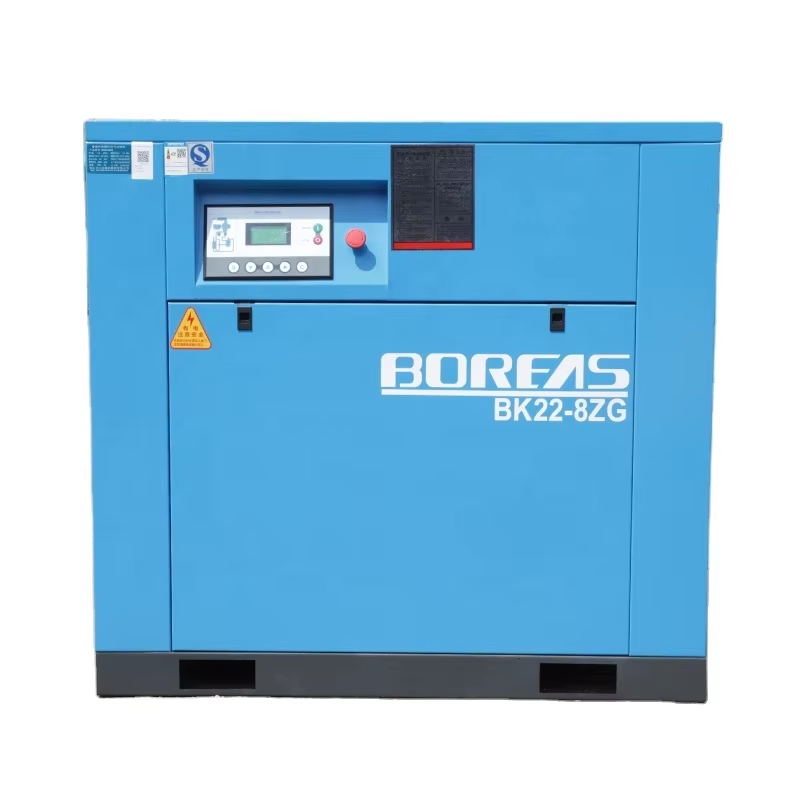Core Differences Between Oil and Oil-Free Air Compressors
Lubrication Methods: Oil vs. Permanent Coatings
The main difference between oil and oil-free air compressors lies in how they handle lubrication. Traditional oil compressors need regular oil changes because their systems rely on oil to keep everything running smoothly over time. Maintenance becomes part of the routine for these machines. Oil-free models take a different approach altogether. They have special coatings applied during manufacturing that basically do away with the need for oil lubrication entirely. These coatings actually help parts last longer since there's less friction wearing them down, which means fewer replacements and savings on maintenance expenses in the long run. Most manufacturers agree that when clean air matters most, like in places making medicines or processing food products, oil-free compressors are the way to go. Nobody wants traces of oil getting mixed into something meant for consumption after all.
Maintenance Requirements: Oil Changes vs. Minimal Upkeep
When it comes to maintenance needs, there's a big difference between oil and oil-free air compressors. The oil versions need constant attention - checking oil levels, changing filters, all sorts of stuff that eats up both money and time. We're talking hundreds each year just to keep these machines running properly. Oil-free models tell a different story though. They pretty much run themselves most of the time, which means less downtime and better productivity overall. Companies switching to oil-free systems typically see around 40% savings in yearly maintenance expenses compared to what they paid before. No wonder so many businesses are making the switch when looking at ways to cut costs without sacrificing performance.
Mechanical Design and Durability
Oil compressors generally have more complicated mechanical setups because they contain extra moving parts. This complexity often results in more frequent breakdowns and longer periods when the equipment isn't working. Oil free models take a different approach altogether. Their simpler construction actually makes these machines last longer in the field. They're also much lighter weight, so workers can move them around job sites without too much hassle. Field technicians know that oil free units typically run for years before needing major repairs since there's just less friction between components over time. For construction crews or maintenance teams that need dependable tools that won't sit idle during crucial moments, this reliability combined with portability gives oil free compressors a clear edge in real world operations.
Performance and Efficiency Comparison
Noise Levels: Impact of Modern Sound-Reduction Technology
Oil free compressors are really good at cutting down on noise because they come with special sound reduction tech built right in. That makes these machines perfect for places where people need to work without constant background noise. Some research points out that these compressors run around 60 decibels or so, which is pretty much what we hear during regular conversations between coworkers. Workplace comfort definitely improves when equipment isn't constantly buzzing away. Traditional oil based models tell another story though. They tend to hit noise levels over 75 dB, sometimes even louder. This means businesses usually end up spending extra money on things like acoustic panels or other noise control solutions just to make their workspace bearable.
Energy Efficiency and Environmental Impact
Oil free compressors tend to beat out traditional oil lubricated models when it comes to energy efficiency, sometimes cutting power usage by as much as 30%. This makes them great for reducing those monthly utility bills. From an environmental standpoint, they're also better since they emit less pollution and eliminate the mess and danger associated with oil leaks. As manufacturing sectors across the globe push harder toward green initiatives, many companies are turning to oil free options not just because they want to save money but also because they genuinely care about leaving a smaller carbon footprint for future generations.
Lifespan and Heat Management
One big plus of oil free compressors is how they handle heat without relying on oil that breaks down when things get too hot, so there's no risk of overheating issues. Tests show these models keep running strong even when temps climb, which means they last longer before needing replacement. For businesses where temperature control matters a lot, this kind of heat handling makes all the difference. That's why many manufacturing plants have switched to oil free systems recently.
Applications and Industry-Specific Needs
Oil-Free Compressors in Sensitive Industries (Pharmaceuticals, Food & Beverage)
Oil free compressors play a really important role in industries that rely heavily on clean air, especially places like pharmaceutical manufacturing and food processing plants. When dealing with products that need to stay uncontaminated, these compressors make sure there's absolutely no oil getting mixed in. They meet all those tough regulations from organizations such as the FDA which helps keep everything running smoothly without risking product contamination. Looking at what's happening in the market right now, manufacturers report around a 40% increase in their need for oil free equipment specifically in pharma applications. This surge makes sense when we consider how strict quality controls have become across the industry to protect consumer safety and maintain product standards.
Oil-Lubricated Compressors for Heavy-Duty Industrial Use
Oil lubricated compressors power many tough industrial jobs across construction sites and manufacturing plants daily. They work great because they can handle really high pressures when reliability matters most. Built to last through rough conditions and long hours on the job without losing steam. That's why these machines shine in tough situations where other equipment might fail. The oil keeps everything running smoothly over time, which explains why so many factories and workshops rely on them for years at a stretch. From steel mills to automotive assembly lines, these compressors keep operations moving forward even under constant stress.
Portable Air Compressors: Mobility vs. Power
Portable air compressors manage to keep things light enough to carry around but still pack enough punch for real work, which makes them great on job sites or when fixing cars. Looking at power output shows something interesting too. The oil free versions definitely win points for being easy to move around, but if someone needs steady pressure for tougher jobs, they'll probably want one of those oil lubricated models instead. Industry pros have been talking about this quite a bit lately. According to recent industry feedback, more than half of technicians actually look for units that hit that sweet spot between being mobile and powerful enough for serious tasks. This trend is shaping how manufacturers think about what features matter most these days.
Cost Analysis: Initial Investment vs. Long-Term Savings
Upfront Costs of Oil vs. Oil-Free Models
Looking at what they cost upfront, oil compressors tend to be cheaper than oil-free models, which is why many businesses go for them when trying to keep initial spending down. But wait there's more to consider beyond just the first purchase price. Oil free compressors definitely cost more initially, though this extra expense gets made up over time through lower maintenance bills and better energy efficiency. Speaking of prices, technology improvements have actually brought down the cost of oil free compressors by around 15 percent in the last few years according to industry reports. With this kind of pricing shift happening, oil free systems might start looking pretty good for companies thinking about how things will work out financially in the long run.
Maintenance Expenses Over Time
Oil compressors do tend to have a lower upfront price tag, but what many people overlook are the ongoing costs. Regular oil changes, filter replacements, and unexpected repairs add up pretty quickly over time. Oil-free compressors typically require much less maintenance overall, something manufacturers often point out as a major selling point. Looking at actual numbers from industry reports, maintenance bills for oil compressors run anywhere between 3 to 4 times what businesses spend on maintaining oil-free units each year. For small operations especially, this kind of cost gap makes all the difference when budgeting for equipment over several years.
Energy Savings and ROI Considerations
Switching to oil free compressors often results in real money saved on energy bills, something that matters a lot for ROI calculations especially when machines run non stop in manufacturing plants or processing facilities. The upfront price tag might seem steep at first glance, but many companies find they break even within around four years once those monthly electric costs start dropping plus there's less money spent fixing parts down the road. Industry reports point out that doing what's called a Total Cost of Ownership analysis makes all the difference here. This basically means looking beyond just the sticker price and factoring in everything from day to day operating expenses to how often repairs are needed over time. When factory managers actually sit down and crunch these numbers, they usually end up realizing oil free models pay for themselves much faster than traditional options despite costing more initially.
How to Choose the Right Air Compressor for Your Needs
Assessing Air Purity Requirements (ISO Class 0 vs. Class 1)
Getting the right air purity level matters a lot in sectors where clean air makes all the difference, think pharmaceutical manufacturing or hospital settings. ISO Class 0 compressors produce completely oil-free air, something that stops contaminants from messing with products during production runs. Then there are Class 1 models which might let tiny amounts of oil through, enough to cause problems in applications where even minute impurities count against quality control standards. Most industries face strict regulations around air purity anyway, so companies need to really look at what their operations actually require before choosing equipment. Knowing the differences between these classes helps businesses pick compressors they can trust won't compromise their end results down the line.
Frequency of Use and Workload Demands
When looking at how often something gets used and what kind of workload it handles, this matters a lot for keeping compressors running well and matching actual needs. Continuous operation environments really benefit from heavy duty oil compressors since they tend to last longer under constant strain. But if the equipment only runs occasionally, going with an oil free model makes sense because these require much less upkeep over time. Most manufacturers have detailed info on recommended usage patterns and technical specs that help narrow down options. Taking all this into account helps pick a compressor that actually works day after day without breaking down unexpectedly.
Budget Constraints and Future-Proofing
When picking out compressors, budget definitely matters at first glance, but ignoring what these machines will cost to run down the road can cause serious money problems later on. A good rule of thumb? Look at not just how much they cost upfront, but also what kind of maintenance headaches and electricity bills come along with them over time. Smart buyers want equipment that grows with their needs instead of forcing constant replacements when things change. Industry pros usually point toward quality over penny-pinching when selecting compressors. Sure, those cheap models might look tempting now, but investing in something durable enough to handle bigger workloads as business expands actually saves cash in the end. This makes sense from every angle - less downtime, fewer repairs, and overall better value for money spent.

